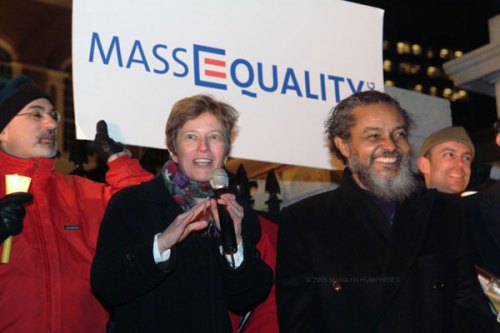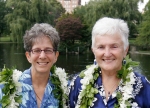Pat Gozemba
The story of Edith Windsor and Thea Spyer has intrigued me since I came across their marriage announcement in the New York Times. On Nov. 12, 2010 on this blog I posted a short video of them. Check it out in the Nov. 12, 2010 blog below.
A $363,000 Tax Bill to Widow Led to Obama Shift in Defense of Marriage Act
from Bloomberg News
http://www.bloomberg.com/news/2011-02-28/a-363-000-tax-bill-to-widow-led-to-obama-shift-in-defense-of-marriage-act.html
Widow’s Tax Bill Led to Shift on Marriage Act
Same-sex marriage is lawful in Massachusetts, Connecticut, New Hampshire, Vermont, Iowa and the District of Columbia. Photographer: David McNew/Getty Images
Edith Windsor and Thea Spyer had a 40-year engagement and a two-year marriage, starting with a wedding in Canada recognized under the laws of New York, where they lived, and ending when Spyer died two years ago.
Her death triggered a $363,053 federal tax bill from which her widow would have been exempt had she been married to a man, because the federal Defense of Marriage Act bars the U.S. government from recognizing same-sex unions.
Windsor’s lawsuit challenging the constitutionality of the act was one of two cited by the Obama administration to justify its decision to stop defending the law. The decision may be a turning point in the fight over putting same-sex marriages on the same footing as heterosexual unions.
“I couldn’t believe that our government would charge me $350,000 because I was married to a woman and not a man,” Windsor, 81, said in a video statement from the American Civil Liberties Union, which is helping to represent her.
Signed into law by President Bill Clinton, the act by 2003 affected 1,138 federal programs in which marital status was a factor in eligibility for benefits, according to the government.
Windsor’s suit to reclaim Spyer’s money from the U.S. is one of two cited by Attorney General Eric Holder in a Feb. 23 announcement that President Barack Obama’s administration would not defend the law in court.
The U.S. won’t argue the act is constitutional in Windsor’s case in federal court in New York and in a Connecticut case involving seven plaintiffs, Holder said in a press statement and letter to House Speaker John Boehner, an Ohio Republican. Notices went to the judges Feb. 25.
Connecticut Case
In the Connecticut case, the seven people — each a survivor or partner of a state-recognized gay spouse — say the act deprived them of the same federal benefits afforded heterosexual couples.
Holder said the department will provide Congress “a full and fair opportunity to participate in the litigation.”
A Boehner spokesman, Kevin Smith, declined in a phone interview to say if, when or how Congress might enter the fray.
Both women in the New York case were professionals, with homes in Manhattan and Long Island. The Amsterdam-born Spyer was a clinical psychologist. Windsor, born in Philadelphia, earned a master’s degree in mathematics from New York University and built a career as a manager for International Business Machines Corp., according to a complaint filed in her case.
Their relationship began in a Greenwich Village restaurant in 1963 while both women were in their 30s. They “danced together all night,” according to the document.
Two years later, they met again on Long Island and were together from then until Spyer died.
Plan for Life
“I’d like to date for a year,” the document quotes Windsor as telling Spyer. “And if that goes the way it is now, I think I’d like to be engaged, say for a year. And if it still feels this goofy joyous, I’d like us to spend the rest of our lives together.”
An engagement that started in 1967, symbolized by a diamond pin instead of a ring that would attract notice at IBM, lasted 40 years. In 2007, with same-sex marriage then legal in Canada, they married in Toronto at ages 77 and 75.
New York, where a bill extending the right to marry to same-sex couples was defeated in 2009, recognizes such marriages that are legal in other jurisdictions, according to Windsor’s complaint.
Most recently, a New York appeals court ruled last week that the surviving husband of a same-sex couple married in Canada can inherit from the deceased man’s estate as any other spouse would.
Long Fight
Spyer, at age 45, started a three-decade battle with multiple sclerosis. Her last dances with Windsor were in an electric wheelchair. Later she developed a narrowing of a heart valve, according to the court document. She died in 2009.
Windsor paid the federal estate tax, giving her the right to ask for a refund and sue when it was denied, which she did in November.
She argues through her lawyers at Paul, Weiss, Rifkind, Wharton & Garrison and the ACLU that the government lacks both a rational basis for the marriage act “much less a compelling interest” — the legal tests for treating members of one particular group differently from others.
Four other challenges to the law are pending in federal courts in San Francisco and in Boston, where the government has already appealed Judge Joseph L. Tauro’s July 8 decision that federal regulation of marriage was an unconstitutional breach of states’ rights. Same-sex marriage is lawful in Massachusetts.
The marriage act, Tauro ruled, forced the state to “engage in invidious discrimination against its own citizens in order to receive and retain federal funds.”
Six Challenges
Only six challenges to the 15-year-old law are in federal courts because nobody had standing to sue until same-sex marriage became legal in some places, said Jennifer Pizer, an attorney for the gay-rights group Lambda Legal.
Same-sex marriage is lawful in Massachusetts, Connecticut, New Hampshire, Vermont, Iowa and the District of Columbia.
Holder, in his letter to Boehner and in his press statement, said he will tell the U.S. Court of Appeals in Boston and the judges in two San Francisco cases who are also considering the Defense of Marriage Act’s constitutionality that the more rigorous standard of constitutional review is required.
The current standard under case law in those federal circuits is that there merely be a rational basis for the law. There is no Supreme Court ruling on the marriage act that would resolve the difference.
Precedent Lacking
The appeals court that would hear the Windsor and Connecticut cases has no such precedent to follow, Holder said.
The higher standard, whether the law is substantially related to an important government objective, is used to assess the constitutionality of laws targeting minority groups that have historically suffered discrimination, the attorney general wrote.
The Obama Administration’s abdication drew fire from the marriage act’s supporters.
Michael Steel, a spokesman for Boehner, said in an e-mail he questions why President Barack Obama “thinks now is the appropriate time to stir up a controversial issue that sharply divides the nation” when “most Americans want Washington to focus on creating jobs and cutting spending.”
Texas Attorney General Greg Abbott said the law is “undoubtedly constitutional.” He accused Obama of politicizing the Justice Department, trying to empower judges to ignore democratically enacted legislation that conflicts with his ideological preference.
Supreme Court Silence
No challenge to the law has gone to the Supreme Court, and it has never said sexual orientation is cause for a heightened standard of statutory review, said Harvard Law School Professor Charles Fried, a U.S. solicitor general under Republican President Ronald Reagan.
Fried said he thinks the law is unconstitutional because marriage is an issue for states, not the federal government.
“If the states want to say this is a marriage, I don’t think the feds should be interfering with it,” he said in a Feb. 25 interview, referring to same-sex unions.
At the same time, he criticized the Obama administration for abandoning the defense of the statute.
“They should have held their noses and defended it,” Fried said. “That’s their job.”
The absence of administration support for the marriage act doesn’t mean its challengers have won.
The Justice Department will continue to enforce the law, Holder said, meaning that the administration’s abandonment of the statute’s defense shouldn’t be construed as granting same- sex couples the same federal benefits as heterosexuals.
Enforcement Requirement
The federal government is bound to enforce the law as it applies to federal rules unless it is repealed by Congress or “the judicial branch renders a definitive verdict against the law’s constitutionality,” Holder said in the letter to Boehner.
“Much of the legal landscape has changed in the 15 years since Congress passed DOMA,” Holder said.
“The Supreme Court has ruled that laws criminalizing homosexual conduct are unconstitutional. Congress has repealed the military’s Don’t Ask, Don’t Tell policy. Several lower courts have ruled DOMA itself to be unconstitutional.”
Besides the states where gay marriage is legal, seven others recognize civil unions, under which some of the same protections afforded heterosexual couples are extended to same- sex couples.
Hawaii Governor Neil Abercrombie signed a civil-union bill into law on Feb. 23. A similar Illinois law takes effect June 1.
State Constitutions
Twenty-nine states including Florida, Texas, Missouri, Virginia and Utah have constitutional amendments barring same- sex marriage, according to Lambda Legal, a proponent of equal rights for gay, lesbian and transgender people.
The Supreme Court backed gay rights in 1996 when it overturned a Colorado constitutional amendment that banned anti- discrimination protection for homosexuals, and again in 2003, when it struck down state laws criminalizing sodomy.
In both cases, Justice Anthony Kennedy’s majority opinion suggested the government needed to show more than just a rational basis for enacting the challenged law. Kennedy looms as the potential swing vote should the court take up a gay marriage case, according to Paul Smith, a Jenner & Block LLP lawyer who argued on behalf of opponents of the sodomy laws and represents some of the challengers to the federal marriage law.
“One could certainly predict that he’d be likely to apply some form of heightened scrutiny even if he might still call it rational basis,” Smith said.
Motions Due
Motions to dismiss in Windsor’s case and the Connecticut matter are due March 11.
Congress could join the case by getting permission from the court, Fried said. He said it’s unclear whether the houses of Congress could act independently of each other.
Lambda’s Pizer said the appeals court in the Boston case probably would give Congress permission to intervene so there would be a complete set of arguments for Supreme Court review.
“There will be defenders,” James Esseks, an ACLU attorney, predicted. “It just won’t be the Department of Justice.”



